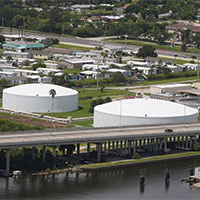 Vero hoping to move sewer plant by 2021
Vero hoping to move sewer plant by 2021
STORY
In its first proactive step to get the city’s sewer plant off the Indian River lagoon, the Vero Beach City Council directed staff last week to come back with a proposal to move the plant to the airport by 2021.
This “whitepaper” the council asked for is expected to present a plan to take advantage of an opportunity to finance the project through bonds or loans after the city pays off tens of millions in debt seven years from now.
Rough estimates put the cost of the project at $25 million or more, which would not only free up the 16.3 acres of prime riverfront property, but also give Vero a new wastewater treatment facility to serve ratepayers going forward.
“This is a great thing that we’re doing for the city,” Mayor Dick Winger said after the meeting. Both Winger and Councilwoman Pilar Turner campaigned on the take-down of the sewer plant and have throughout their terms repeatedly urged the staff to get working on concrete plans to get it done, for environmental and aesthetic reasons.
City officials assure the public that the plant poses no threat to the lagoon as the city no longer discharges waste into the water, but getting the aging facility off the waterfront would eliminate any possibility of an accident spilling raw sewage or chemicals into the delicate estuary.
Finance Director Cindy Lawson said the whitepaper would address “engineering, financing, time frames, etc.” But don’t expect the document to come back in a week or two, City Manager Jim O’Connor said. The fate of the sewer plant is one big piece of the long-term vision that Vero must set for the future of the riverfront.
When Indian River County made a proposal in 2011 to take over Vero’s water-sewer system for the cost of its $24 million in debt, the county proposed dismantling the plant as it has plenty of capacity at its own plants to handle Vero’s effluent. When the city summarily rejected that proposal to consolidate services, it seemed any hopes of getting what’s been called “the toilet on the river” moved westward were dashed.
Vero shows no signs of wanting to get out of the water-sewer business. In 2012 the city negotiated a new franchise agreement with Indian River Shores, locking those customers into the Vero system for decades, by offering Indian River County rates for water, sewer and reuse water service.
Earlier this year, the Vero council seemed to have mollified South Beach customers by extending Indian River County rates to them as well, and by removing the 10 percent surcharge that had long been a bone of contention. Both the Shores and South Beach are paying a 6 percent equalization fee to Vero and neither group is overjoyed about that, but at least they’re on the county rate structure and buffered from rate hikes.
Despite the conversion to Indian River County Utilities rates, the city says its revenues have actually gone up slightly since the conversion to county rates. City residents are the only ones left on city rates.
“This is a very strong business for us. We have very good capital although there are a lot of future plans. I know the council has talked numerous times about moving the plant off the river. We’re sort-of building our base,” said City Manager Jim O’Connor, so a portion of the cost could be paid in cash if that was the pleasure of the council at the time. “It appears very strong at this point.”
At the same time, Vero officials have been exploring ideas for restructuring the city’s long-term power contracts and upgrading transmission facilities so the Big Blue power plant could also be dismantled.
This would have happened a few years down the road after a closing in the sale of the electric utility to Florida Power and Light, but with that deal recently pronounced dead, Vero is looking at other options for reducing electric rates. Mothballing the power plant could save between $3 million and $4 million in operating expenses per year.
The 17.4-acre power plant property, the 16.3-acre sewer plant site, plus the 4.61-acre parcel on the southwest corner known as the “old postal annex” property total nearly 40 acres. The electric and sewer plants, if both decommissioned, would give the city 1,300 feet of prime riverfront property.
Ideas that have been tossed out by long-time residents, neighboring property owners, public officials and engineering experts have ranged from simply setting aside the property as park land to leasing it long-term for a marina, dining and entertainment complex or a hotel and small convention center.
A group of local developers has proposed a high-end shopping center for the property west of Indian River Boulevard south of 17th Street. That proposal was tied to the sale of Vero Electric to FPL and now seems to have fallen by the wayside.








